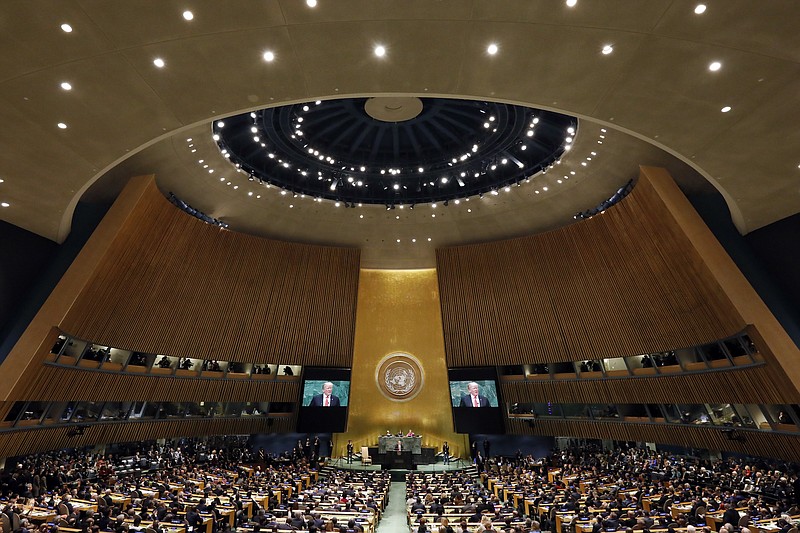When Donald Trump spoke at the United Nations on Sept. 25 and provoked guffaws from the diplomats in the audience for his boasting, Trump insisted that they were not laughing at him, they were laughing with him. I wasn't there so I can't say what they were actually doing on the outside. But on the inside, I'm pretty sure I know: They were crying.
They were crying over the fact that the America they had come to know and respect over the last 70 years - and whose generosity and security order they had come to rely upon and even take advantage of at times - had left the building.
It had been replaced by Trump's America, which is different in two fundamental ways.
First, Trump's America does not see itself as the galvanizer and protector of the liberal global order that brought more peace, prosperity and democracy to more corners of the world over the last 70 years than at any time in history.
Second, Trump's America is unafraid to engage in the raw exercise of power against any foe or friend to gain economic or geopolitical advantage - no matter how big or small - and, at the same time, is ready to overlook any human rights abuse or killing by any country deemed friendly to Trump personally or not interesting to him geopolitically.
But hey, wait a minute: Does Trump have a point? International relations isn't a knitting circle. Could it be that the U.S. is actually best served by having a lying, unethical bully at the helm? As Trump declared: "I am the president of the United States. I'm not the president of the globe." So get the hell off my lawn!
It all depends just how far Trump goes with this. Will it be a mild departure from the approach of every other U.S. president of the postwar era or a radical departure? I don't know yet, but if you look around, a lot of people are acting as if the cat's away, so the mice can play.
Does anyone believe for a second that Saudi Arabia would have - according to Turkish reports - flown two private jets into Istanbul with a hit team and brazenly abducted or murdered the moderate Saudi journalist Jamal Khashoggi? There is no way that the regime of Saudi Crown Prince Mohammed bin Salman would have dared to do that if it thought Trump would care. And so far, Trump hasn't.
Meanwhile, Russian President Vladimir Putin has felt quite confident about poisoning ex-spies living in Britain. And how about that Russian investigative journalist who just happened to jump out a window? And how about China's arresting the head of the global policing organization, Interpol, Meng Hongwei, a Chinese citizen, when he was home for a visit?
And then there were the protests in Bulgaria's capital, Sofia, over the arrests of two reporters, a Bulgarian and a Romanian, who were "apprehended as they tried to film the subjects of their investigation burning documents related to the misuse of EU funds," according to Balkaninsight.com.
The U.S. can't always make the world better, but we can, by what we say and do, give foreign leaders pause about exercising their darkest sides. And we're not.
So, no, Trump doesn't have a point. Robert Kagan, in his incisive, elegantly written new book about America's unique role in the world, "The Jungle Grows Back," makes that clear.
Kagan's core thesis, as he explained in an interview, is that if you look at the broad sweep of human history, "democracy is the rarest form of government." That's because for most of history, great powers constantly clashed and most people were constantly poor. "But for the last 70-plus years we have been living in the greatest prosperity ever known - globally - and we've witnessed the most widespread booming of democracy and the longest period of great-power peace ever known."
The key pillars of this liberal world order, Kagan argued, were the conversion of Germany and Japan from aggressive dictatorships to pacifist democracies, the building of a global trading regime and the backing of it all with certain made-in-America norms and rules of commerce and geopolitics, buttressed by the U.S. Navy, Air Force and Army.
This liberal world order "is not the product of human evolution" - as if human beings have somehow learned to be more peaceful with one another, Kagan argued. It developed because the most powerful nation on the planet, the United States of America, "was born of Enlightenment principles," and, after being dragged into two world wars in the 20th century, it decided to use its power to spread and maintain those principles - not everywhere and always, but in many places a lot of the time.
And when I say "power" I don't just mean military power. I mean also convening power. When the U.N.'s top climate body issues a report - as it just did - that says our weather, our ocean levels, our agriculture and our ecosystems are going to be disrupted, so much more than people realize, unless we take huge steps now to mitigate climate change, and the U.S. president ignores it, we are failing in our task to stabilize the liberal global order and are paving the way for disorder.
So when Trump says that we are just going to look out for ourselves, he shows his ignorance of both history and economics. Trump is pursuing "a great American fantasy," added Kagan. It's a fantasy that we can be "irresponsible" and we'll be OK. The world will be far more threatened by too little American order-making than too much.
"It will be springtime for thugs," Kagan concluded - and the signs of that are now multiplying.
The New York Times
